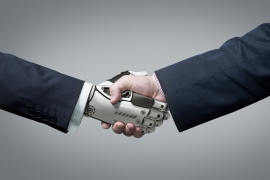
Artificial intelligence (AI) is the future of technology. It is not just a buzzword anymore but an essential part of our lives. The government, tech giants, and startups are pouring billions of dollars into this technology as they see its potential to disrupt every industry there is today.
Customer Service
AI is being used in customer service to automate everyday tasks, such as answering a phone call or looking up information. AI can also be used to help identify patterns and trends in customer service, which can help companies improve their customer satisfaction. With the growing popularity of artificial intelligence (AI), many businesses are implementing this technology into their business operations.
For example, if a customer calls your company’s call center and asks about something you sell, it will be easier for them to use natural language processing (NLP) software that listens for keywords like “product” and “price” and then pulls relevant information from your database. This makes it faster and easier for customers to get the answers they need without waiting on hold or speaking with multiple people at once.
A real-life example of a company using AI today in customer service is Amazon, which uses AI to help customers find products they will like. If a customer searches for something on Amazon, it might be able to predict what other items they would want based on their past purchases and then show those items on the search results page. This is also an example of NLP software because it listens for keywords such as “product” and “price” and pulls relevant information from your database.
Business Operations
AI could help to make businesses more efficient. By automating many routine tasks and processes, AI will free up human capital for more important tasks. For example, instead of having employees spend their day manually responding to customer inquiries, they can now focus on developing new products or improving existing ones.
Once businesses become more efficient, they’re able to be more productive in the long run-and that’s where AI shines! Instead of relying on understaffed teams who are constantly overworked, companies can invest in tools that minimize manual labor while maximizing productivity by allowing employees to focus on higher-level tasks like strategic planning and market research.
Healthcare

The healthcare industry is one of the most promising industries for AI implementation. With the help of AI, doctors can be alerted to potential health problems before they occur. For example, if a patient has a family history of diabetes and obesity, an algorithm can flag their risk levels as high and suggest they get a physical exam from a physician. Another example is if a healthcare worker needs a medical laboratory equipment supplier, they can use an AI-driven search engine to find the best options for their needs. This can save time and money and help healthcare workers stay updated on the latest technologies in the field.
AI also benefits medical professionals by enabling them to focus their time on patients who need immediate attention instead of spending time searching for information or records about previous visits that may not be relevant in the current situation. In addition to saving time for doctors and nurses, this technology allows clinicians at various levels of expertise to access knowledge previously inaccessible without extensive training in medicine or research (i.e., radiologists).
Manufacturing
AI is being used to automate manufacturing processes. For example, AI-powered robots can be programmed with the 3D model of an object and use computer vision technology to identify and pick up the right parts. They can also use machine learning technology to learn how to perform tasks by observing human workers or even other robots in their vicinity, thus reducing the need for complex instructions.
AI is also being used to improve the quality of products by eliminating defects at every stage of production. For instance, NIKE’s new HyperAdapt shoes contain sensors that help keep track of foot pressure and temperature, as well as other metrics like stride length and cadence (the number of steps taken). This allows NIKE’s AI platform-called Nike Adapt BB-to monitor each user’s activity level so it can adjust accordingly based on feedback about comfort levels. Suppose someone feels sore after running a marathon. In that case, they may want their next pair fit modified so it feels more comfortable during longer runs without sacrificing support or stability.
Marketing
Marketing is an industry where AI has already made a significant impact. Marketers are using AI to understand their customers better, make better decisions and personalize marketing campaigns.
In addition, machine learning techniques enable marketers to automate the creation of content, such as articles or videos, requiring little human involvement. For example, by using large amounts of data on pieces that perform well in search engines, content can be created that closely matches what people have been searching for online. Machine learning algorithms are also being used to analyze images posted on social media to identify objects within them; this information could then be used to create promotional material targeted at individual consumers based on their interests.
In addition, there is potential for AI technologies like computer vision (CV) and natural language processing (NLP) to improve the accuracy of sentiment analysis when analyzing reviews on sites like Trustpilot or TripAdvisor. This could help businesses identify any potential issues before they become serious problems, allowing them to react quickly before any damage is done.
Closing Thoughts
Artificial intelligence is one of the most significant technological advancements we’ve seen in recent years. With its ability to tackle complex problems and make decisions based on data, AI holds great promise for businesses of all sizes. Companies need to know how to use this technology to improve their performance and stay competitive in today’s fast-paced world.

Be the first to comment on "How Business Sectors Are Using Artificial Intelligence Today"